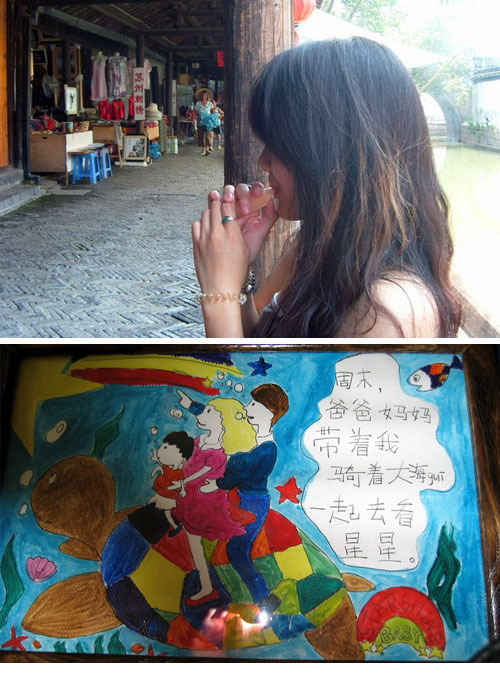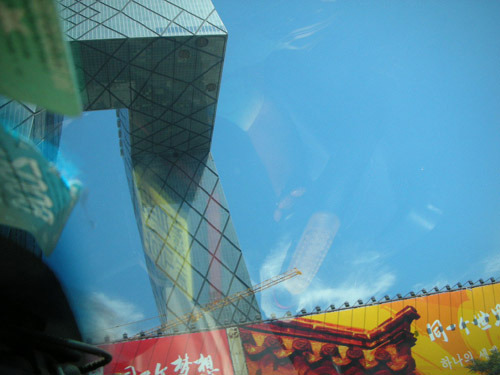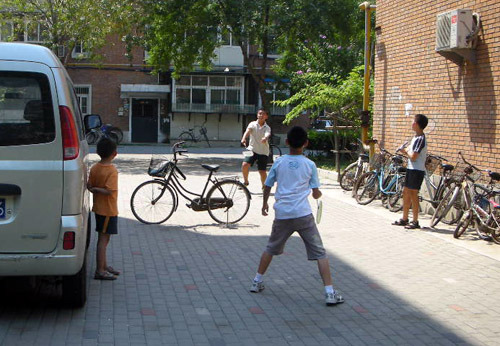Guerrilla Green
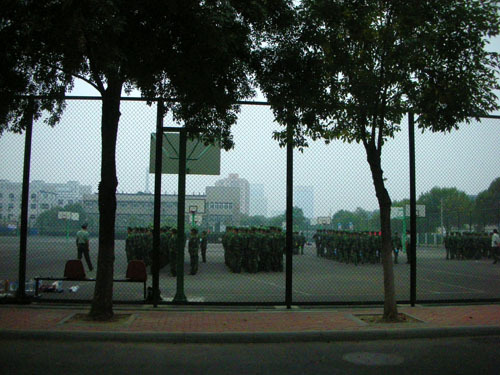
A new school year means military training for the college freshmen, where guerrilla green run flocks like a moving forest. Kids go for 10 days, as opposed to 20 years ago, when daddy apparently led a three month summer training. Still, by the end of the 10 days, everyone is dark as charcoal.
49
Finally it’s over. My friend Xiao Man and roommate for a month noted in conclusion: “hospitals will sure get busy now with people submitting themselves in for over-exhaustion.” As an English tour guide during the Olympics, Xiao Man has been on the frontlines for “foreign diplomacy” in Beijing. In the span of the two weeks I’ve been here, I’d only seen her at ungodly hours. Mostly, it’s her empty room that greets me in the morning, and the same half swung door unmoved when I’m back home ready to crash. The worst of her errands included picking up a foreign guest at the airport four in the morning, but Xiao Man is always chipper, and though she complains about working so hard, she does it with a smile. It must be the ungodly optimism that everyone is infected with here. “These days, Chinese people are probably the hardest working bunch on the planet. Our white collar workers have it bad. Our farmers also have it bad.” She talked about a friend in Shanghai who pulled insane hours working in finance, who bought Gucci, Versace, and Givenchy to build a closet of “happiness.”
We were strolling through a park in the middle of Beijing. It’s the type of park that you can only find in cities —a horizontal strip of concrete incorporated modern art—with silver half spheres sprouting from the ground—as an area of benches. Young lovers talked intimately and text messaged furiously. Old lovers walked their dog—usually in the tiny, cute variety—together. Some non-lovers were sprawled out on the benches, taking a much needed nap after a long day. Every few while, there would be a gathering of old people singing and dancing. Classic Soviet folk songs faded and became Canto-love songs, Canto-love songs dipped low and become a memory. For a moment, it was hard to believe that this could be one of the hardest working country in the world, what with all the time the dancers and singers at the parks seems to have.
Okay, clearly, I need to retire here. I confessed to Xiao Man, and she laughed, and like a good tour guide that she was, pointed to the trees around us: “Beijing’s gotten so much greener in the past seven years I’ve been here,” and waved at the strip of Hutong that now housed the hippest coffee shops and bars, “this place used to be residential Beijing, you know, old Beijing, if you could have gotten coffees, they’d probably be 3 yuan, instead of the ridiculous 30 yuan foreigner prices now.”
Hey Xiao Man, I asked. What’s the toughest question foreigners ask you in China? “Tough… I don’t know. In Tiananmen Square, they would always ask about June 4th. Without fail.” What do you say? Are they critical? “Yes, of course, and I tell them, I’m not qualified to answer that. I haven’t lived it. It’s too complicated of a problem. We’re here to have fun. No need to put a damper on things with politics.” Do they press you on? “Sometimes. Then I tell them, that tank stopped in front of that kid, not run him over. Then I ask them, do you know the name of our president? No? Well… then on what grounds do we have to talk about this? That usually ends the conversation pretty well.” Xiao Man asked me about western media. How do they really portray China? Is it bad? Is it fair? I don’t know. I told her. The west tends to report on negative stuff in China, but maybe for the equilibrium of things. One CCTV might just be enough, maybe it was for best. “I’m going to go someday and find out myself. I introduce China to foreigners all the time, but I don’t know what environment they grew up in, come from. I want to know,” she said.
We paid 39 yuan (approx $5) for foot massages mostly because we wanted to catch one of the last competitions where China is competing in—the 10 meter platform diving. Only in China could I get massages without feeling guilty for my pocket. Only in China do I feel guilty for getting massages. That night China “lost” her 50th gold. We shrugged on. It’s okay. 48 medals is nice because of the auspicious eight. 50 is nice because it’s round and even and easy. Now 49, 49 you remember. 49 is 7x7. 49 is perfect. Footnote: and then a day later I find we’re at 51. Go figure. I have nothing to say for 51. Haha.
Olympics Park
Day trip at the Olympics park, where we all got a little tanner despite a hat, sunglasses, and an umbrella (because it was raining yesterday) ensemble. It was hot. It was bright. I want my smoggy, cloudy, egg yolk sun back instead of swimming in a sea of sun umbrellas on a 90 degree day at the concrete jungle that is the Olympics park. So story is, nobody can get close to the Bird Nest/Water Cube/Olympics Park in BJ these days unless you have a ticket to a game, were lucky enough to covet a “tour” ticket that was given to specific companies, or like Rong&I, knew a friend who worked inside who knew somebody in charge of letting people in. To be honest though, the park was a bit of strange experience, a hybrid of commercialization, mediocre sculptures, and one of the biggest McDonald’s I’ve ever seen. We spent the morning visiting a bunch of exhibitions: China Mobile, Johnson&Johnson, Volkswagon, GE, and apparently Coca-Cola has a sweet exhibition but lines are mile long. The day that people start lining up to watch commercials and sweet waterfalls that spell out things like “WIND WATER FIRE METAL EARTH…. GE.” It’s pretty ridiculous. In fact, I don’t know how I feel about this at all.
All in all
to be very honest
I think I may have overdosed on the Olympics
 Rong
Rong
 GE building
GE building
 That is, GE is imagination
That is, GE is imagination
 The GE watercube
The GE watercube
 The FUWA parade
The FUWA parade
 Rain on my parade… ICE ICE baby
Rain on my parade… ICE ICE baby
 Fire baby
Fire baby
 Yep, those are plates they are spinning.
Yep, those are plates they are spinning.
 Shield me from the sun…
Shield me from the sun…
 Little nests… big nests…
Little nests… big nests…

To be frank, the Bird Nest is quite the monstrosity up close and personal.
the coffeeshops of nanluoguxiang
the coffeeshop where we spend our days avoiding the sun… is where goldfishes swim in the sky. If you are ever in Beijing and have editors on your tail / need a good chill spot for inspiration, break a buck (or ¥25) at Nanluoguxiang, a strip of Hutong near Houhai. It’s old Beijing meets western salon, and the result is better than you can hope to be.







breathe in, stay still.
interview with BOCOG member
These days in Beijing, it seems like everyone is involved with the Games one way or another. Whether you’re a flag-seller, or flag waver, the spirit is in the air as much as the presence of televisions seem to spike. You could literally go from one end of the city to the other without missing a score. Every restaurant, coffee shop, bar, fruit vendor, convenient store, not to mention malls, plaza squares, and bus stream the latest competition live. Just take five. I took five and sat down with Wang Gang, a member of the Beijing Organizing Committee for a snapshot of his Olympic life.
 What’s your job title?
What’s your job title?
I’m a staff member of BOCOG (The Beijing Organizing Committee for the Games of the XXIX Olympiad).
What do you do?
On site Chinese commentating. My sports for the Beijing Olympics include track, cycling, BMX, and mountain biking. Mostly, I do consecutive translation of what the English announcer is saying.
Consecutive translation? That’s pretty impressive.
It’s actually not that hard. It’s easy when you are familiar with the sports jargon. It would be hard if I was translating a speech by an economist.
How did you get the gig? Me and most of my CUC (Communication University of China) classmates all applied for something to do during the Olympics. I sent in my application, went through an interview process, and was picked from thousands to be a commentator. Most of my classmates were selected as announcers, which means they do the intro before every event like “Ladies and Gentlemen, welcome to the XXIX Olympiad… etc. etc.” or “Today the weather is fine, a nice 29 degrees.”
What did you have to do to prepare for your job? Just the other day I went in to do a BMX game simulation. Which basically means we screen previous games and do voice over commentating over it.
(At this point, Wang Gang was mixing in a lot of English with his Chinese) Do you realize you speak with an English accent? How did your English get so good? Trainspotting is my favorite movie. A very memorable, very impressive movie. I guess I watch a lot of English movies. I like Jude Law’s accent a lot also and try to emulate it. I’m good enough to do commentating in both English and Chinese. It’s actually my dream to become a sports commentator abroad one day. NBA, here I come.
…So, are you a volunteer? No, not at all. I’m a step above those guys. Paid employee here. I get paid about 80 RMB (about 10 dollars) a day. Enough to get me a pair of new shoes okay? I also enjoy free transportation. Basically, what I’m trying to say is, the Chinese Olympics Committee is shitting on the sweat and blood of energetic youth. It’s great.
Describe your average day for us. Normally, we have to be at the office before 8:00 am and check out by 7:00 pm. I spend a lot of time on PSP, chatting, taking sitting naps. It’s the rule for us to check in everyday though. During competition, of course, it gets busy. Also, the other day I had to pick up an English commentator 4:00 in the morning at the airport. Somebody bought a cheap ticket. So yeah, catering to the needs of foreign announcers and commentators is also part of the job description.
/Wang Gang, August 14, 2008
Bird no more.
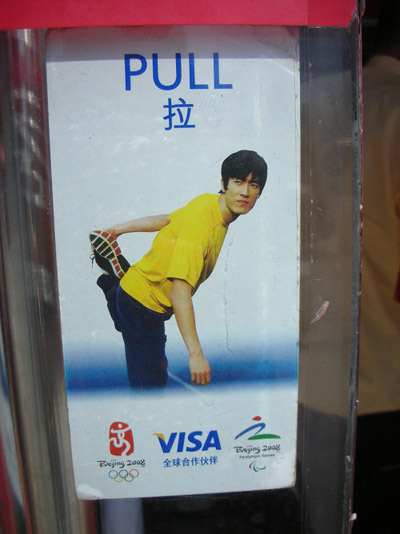
Bird no more.
“Xiang” means flight in Chinese. For hurdler Liu Xiang, who graces everything from Coke cans, Nike spots, Lenovo brochures, China Mobile phone cards, milk ads, and to, well, door handles, his fall from grace may be harder for his advertisers than the average Chinese. Never mind sob articles in the Times that has an entire nation in mourning. Nobody crumbled in tears on the bus I was on while watching him walk off the race, and when I asked my father about it an hour later, “Did you see it?” He replied rather indignantly, “What? On TV? Of course not! Who has time for TV?”
All in all, there are still 1.3 billion people ready and willing to trade heels with him if need be. Go China.
My Favorite Girl
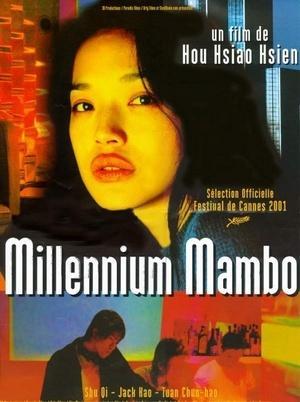
{my favorite girl} sometimes all i want to do is sit back, close my mind, and watch shu qi.
Where were you on 8.8.08
The Perfect Spot Planning to watch the opening ceremony / China’s coming out party is surprisingly not that different from planning the best New Year’s Eve party. In the end you just end up home lazying around on your couch, or you spent the night out walking around aimlessly and wished you had just been lazying around on your couch. I’d considered a couple “perfect” spots to watch the opening. There were the 26 cultural squares with projection screens set up around the city. But being a dot among thousands on a visit to Tiananmen Square made me have second thoughts. So we changed plans and made contact with friends who had reservations at a bar, but then our friend who could get us in was stuck outside fifth ring and coming into the middle of the city by car was an ordeal in Beijing traffic. Maybe it was to our fortune that we ended up crashing on a couch at another friend’s place who happened to live right by the Nest.
The Opening
So we were a couple blocks/a fifteen minute walk from the Bird Nest, at the home of a friend’s in a dense, high-rise residential area. From the bed room window, we get a perfect side view of the nest and the lit-up Olympic torch. It’s snugged almost picture perfect between two buildings and a construction site with four cranes frozen in mid-motion (a scene that all the aerial shots of TV coverage seems to magically eclipse). My friend Rong and I kept on bopping back and forth between the living room with the TV and bedroom every time the fireworks exploded on screen. We are so close we could hear the cheering erupting from the some 90,000 people inside the Bird Nest. The opening fireworks sequence was such a stunner we actually stood up during the national anthem, shaken with pride. Though the harmonious Tai Chi Kung-Fu (dude, I was expecting some Yuen Woo-ping action) and parade of nations kind of slowed thing down, and to be honest, Li Ning lighting the torch wasn’t so impressive beyond the big up yours to Adidas.
After the ceremony, we took a walk around the Bird Nest. No one was allowed in near the stadium without a staff or volunteer pass. So we just wafted through the crowds doing some classic people watching. Hordes of athletes, staff, performers, and volunteers were streaming out of the Nest making their way to a bus or waiting around to be picked up. The city sanctioned that buses run for 24 hours on 8.8.08. Everyone in the crowds appeared to be more exuberant than exhausted. We passed by one Canadian TV reporter who was streaming straight back home something to the likes of “well, they finally wrapped it up in over four hours. This being one of the longest opening ceremony in the history of the Games…” We had a few words of exchange with an athlete who was looking for a good disco, and then there he was, Epke Zonderland of the Netherlands on TV the next morning on the parallel bars. Hope he had a good night out.
Mini Interview with Mr. Mao from China Mobile Communications Corp
(aka largest cellphone provider in mainland China)
At two-thirty in the morning, I caught up with a friend who worked from inside the Nest during the opening ceremony for a quick Q&A.
Q: What’s your job title?
Mao: China Mobile Basetransmissions Engineer
Q: What were you responsible for during the opening ceremony?
Mao: I work on a team that ensures the CMCC network and signals are strong during the opening ceremony and throughout the games in this area.
Q: How many hours did you put in today?
Mao: Eighteen. We worked from eight in the morning to just now, two in the morning. It gets easier after today though. Today’s the big hurtle for the entire nation. I just have to come by the stadium everyday for about two to three hours to check the signal strength after this.
Q: Were you able to see the opening ceremony live?
Mao: No. We were underground doing backstage work and only caught bits and pieces on TV. It’s okay though. I saw some rehearsals and they were impressive enough. They were rehearsing just the other day when it started dumping rain, but everyone toughed through it, streaked makeup and all. I hear they picked their performers straight from the Chinese Liberation Army. All the guys had to be taller than 180cm so they can look regal in those flowy robes. On TV they might look stately, but the entire backstage pretty much stunk of sweat from the thick, sweeping robes. Today’s been really humid.
Q: What was your favorite segment from the opening ceremony and why?
Mao: I loved the part where they had the warriors with the sails, conjuring Zhang He and China’s heritage of exploration. Those sails look like feather but they actually weigh a lot… and I don’t know. I was just watching them and was suddenly really moved. I think that was sort of the tipping point for all the efforts put into this coming to fruit. You have no idea how tense the backstage was during the entire thing. Everyone was holding their breath and freaking out over minute details that could result in mistakes. It really was more tense than celebratory, and I guess while watching the sails sequence, I felt like I could finally let go of my breath and just enjoy it. I mean, for China, the Olympics really is an important turning point for us to join the world stage. China wants to map out a new image of itself, because the images foreigners recall when they think of China are still stuck in history. So like the ‘64 Tokyo Games where the Japanese re-invented their WWII image or how the ‘88 Seoul Games became S. Korea’s coming out party after its civil war, the Beijing Games provides the stage for a nation ready to prove itself.
/Mao Gongyin from CMCC, 8.9.08, 2:30 am
Running Man vs. Kowtowing Man?
 The main conversation aloft between friends during the China vs. Dream 8 game was how the “running-Peking-man” in the official symbol for the ‘08 Olympics also looks like a “kowtowing-Chinese-man.” It took me ages to see it but I’ve always been horrible at magic eye.
The main conversation aloft between friends during the China vs. Dream 8 game was how the “running-Peking-man” in the official symbol for the ‘08 Olympics also looks like a “kowtowing-Chinese-man.” It took me ages to see it but I’ve always been horrible at magic eye.
Instructions on how to see the kowtowing, “please love us foreigners we are a friendly, peace-loving, back-bending people, here for your every need” man.
1. Flip the view you would normally see the running man. 2. The horizontal line (running man’s arms) is the kowtowing-man’s hat. 3. The circle in the middle (running man’s body) is the kowtowing-man’s head, bowing. 4. The running man’s right leg is the kowtowing-man’s bent back. 5. The running man’s left leg is his arm, in upward motion, ready to please.
Rock n' Roll Reborn / Re-Tros Live @ Mao 9/8
 Credit: Shanghai Daily
Credit: Shanghai Daily
Finally met up with Madi from the now dissolved MyLittleDeadDick for a Rebuilding the Rights of Statues’ (Re-Tros) live at Mao’s. I learned about the Drum Tower murder of an American from MSN before heading out, and by the time I came home, Russia was already in war. Mao Live House happens to be about a block from the Drum Tower, in the lively Gulou area /Houhai that’s home to restaurants, bars, shops, and the easy-stroll of Chinese, foreigners, and cabs stuck in traffic alike. Security wasn’t as hyper alert as I’d imagined. The only sense of anxiety I picked up was from a policeman whisking by on a moped. His furrowed brows and uneasy expression made me wonder what was going to happen to the security guards at the Drum Tower.
Madi was joined by a group of her friends at the restaurant we were meeting up in already. Amusingly enough, she tells me that she had just met most of them for the first time herself. The group was assembled from an online Douban (think a more personalized, enthusiastic, and sophisticated cross between Amazon reviews and a Facebook) group. Around the table was a group of photographers, critics, persons in the magazine industry, and as we sat and pounced on the topic of the opening ceremony, it was almost difficult to imagine Beijing as being “unsafe.” This city has always been square and straight and wide and patient.
Yet beneath the calm, under the shroud of 5000 years of the mandate of heaven, of heavy-handed politics and legitimacy, stirs the fists and feathers of something wild. Perhaps this is why Beijing will always be the cultural capital of China, because great art is often born out of a time of unrest, and there’s nothing like rebelling at the foot of Tiananmen. Such is the tone of the Re-Tros show. Rock n’ Roll is re-Made in China in the fist and strums of three music intrigues. When the lights dim, the harrowing voice of lead vocal/guitarist Hua Dong explodes with bassist Liu Min’s yelps in a cry that teeters between nihilism and revolution. Together with Ma Hui, a virtual one-man army contained in drums, Re-Tros were really, truly some of the most beautiful performers I’ve seen with my mortal eyes. This is the time when Rock n’ Roll reborns in China.
Re-tros’s latest EP Cut Off! is available at Tag Team Records and for download on iTunes. Check out their controversial video for TV Show (Hang the Police)
NYTimes on Queueing
The volunteers are part of a much larger script for what may be the most carefully stage-managed spectacle in Olympic history — a grand-scale version of the opening ceremony, intended to demonstrate to the world, and even to the Chinese, that the country has finally arrived as a world-class actor. For one thing, the stage set has been expanded to include not just the various sports venues but the entire city of Beijing. The beggars and the homeless have been rounded up and banished from the streets. People have been urged to quit smoking and spitting, and to adopt the Western custom of standing in line for a bus, instead of jostling.
Beijing 's Three Big Weirds
In a voice of a tour guide, my cab driver asks me, “so do you know what three three big weirds (San Da Guai) Beijing is known for these days?”
The Bird Nest
The Bird Legs
The Bird Egg
Air Quality in Tianjin
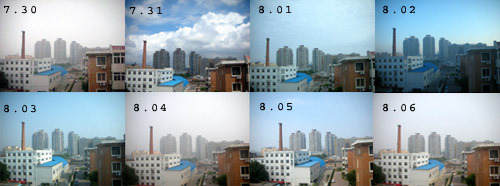
air quality from my window in Tianjin (30 minutes from Beijing by train)
MagazineChina
Music: The Fashion - Solo Impala

Xuehai (“SeaofLearning”) is Tianjin’s best independent bookstore, hands down. I make bold claims because unfortunately, Tianjin is A. known for being a conservative city. There simply aren’t a lot of venues for independent anything. B. the staff at New Younger, a short-lived but spirited Tianjin independent culture magazine came up with a similar conclusion, and I trust they did their scouting homework and C. Its prime location of being near three of the biggest universities in the city.
In reality, Xuehai’s store front is literally a hole in the wall, a first-floor apartment knocked up. The books and magazines are basically all shelved in the “living room” space, and one enters the store either from the makeshift-step-stool or through its actual apartment building. The humble store front doesn’t draw much attention. Most of the magazines advertised on the window front are mainstream ones, not unlike the facade of the dozen other magazine vendors in the city featuring big-eyed Chinese Vogue beauties.
Xuehai lives pretty much on word of mouth. Good thing in China, there’s always many mouths. I was led to Xuehai by a classmate a year ago while studying at Nankai. Having always been keen on magazines and particularly interested in China’s publishing/magazine industry, I’d turned the bookstores upside down, read bestsellers until I was screaming and ready to give up when Xuanzi led me after class one day to this hovel. We’d parked our bikes right in the apartment residential area and I followed her into the building thinking we were going into somebody’s home. By then I’d gone to a couple clandestine DVD stores to know the game, so I wasn’t at all nonplussed when the apartment revealed a room of books, good books.
 One of my wildest dreams is to go to a mall where everything fits me. Styles and colors may vary, but saves me from trying things on. Well, walking into Xuehai is like walking into such a dream. A bookstore tailored to the literary needs of the young hipster artist types, styles and colors may vary, but mostly everything fits. I loved it. I spent loads of money there without feeling guilty because it felt like I was helping to keep the hovel alive. It was also at Xuehai that Xuanzi introduced me to some of the best magazines in China. After another year in the States, I’d picked up a stack last to catch up. The owner of Xuehai keeps his favorite ones (which also happens to be my favorite ones which is why we all worship the adorable owner guy) on a shelf right next to him, a bunch of hard to find / imported mags. Here’s some of last week’s loot, pictured from left to right.
One of my wildest dreams is to go to a mall where everything fits me. Styles and colors may vary, but saves me from trying things on. Well, walking into Xuehai is like walking into such a dream. A bookstore tailored to the literary needs of the young hipster artist types, styles and colors may vary, but mostly everything fits. I loved it. I spent loads of money there without feeling guilty because it felt like I was helping to keep the hovel alive. It was also at Xuehai that Xuanzi introduced me to some of the best magazines in China. After another year in the States, I’d picked up a stack last to catch up. The owner of Xuehai keeps his favorite ones (which also happens to be my favorite ones which is why we all worship the adorable owner guy) on a shelf right next to him, a bunch of hard to find / imported mags. Here’s some of last week’s loot, pictured from left to right.
1. FHM China – I love how I start all this talk of alternative publications with an established, kind of trashy foreign brand, and I’m gonna be honest, I like this mag for two reasons: their cover and their fashion story. In other words, I love their women. FHM is revolutionary for me on an aesthetic level. The pale, petite, fragile beauty embraced by standard Chinese opinion and ad-copy is overwhelmed here, by long-legged, occasionally tan (rough n’ dirty), sexy tall beauties that index straight into my wildest, maybe slightly narcissistic fantasies. Also, their fashion stories are actual fashion stories (like, with the occasional caption and plot!), are plainly ridiculous, and absolutely delicious. ;)
2. Milk – Milk is a popular trends/culture magazine based in Hong Kong. A lot of mainland kids abide by this mag so they’ve got a mainland edition now. I only got this because of the sweet holographic Batman cover. WOO. Contents are pretty thin to be honest. Maybe America’s de-trended me.
3. 360 design – Last year I sworn by IDN. 360 is also a design mag based in HK. They’ve got some sweet Olympic-themed designs in this issue.
4. City Pictorial – The most badass arts/culture magazine for the 18-35 age demographic. I literally bought every back issue they had. Emptied it out. Every time they come out with a new issue I think: they’ve done it this time, this is it, the last time they’re gonna come up with such a creative topic, but then there’s always the next issue. I especially dig their big sweeping essays, the latest of which features a look at the growing number of NGOs in China. City Pictorial should also be applauded because they’re one of the few magazines that play up content and editorial more than design. There’s been a slew of graphic/design/trend magazines out of late. So it’s good to bask in some good, simple writing.
5. New Weekly – is just sweet. Again, good writing, good topics. Somewhere between Time and The Atlantic I’d say.
Additional unmentioned magazines: I didn’t grab any of the independent music magazines this time around because I’m kind of jaded by music in general. Still keeping tabs on a couple online magazines. Notably, Coldtea.cn, Herecomes18, and Rice.
Beijing's Balancing Act
Link: Beijing's Balancing Act If you read only one essay about China this month, let it be this one.
Beijing Coma
After all, many benign impulses surely flourish under the frantic and gaudy surface of modernizing China.
on Beijing Coma
